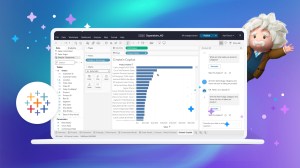Australian office workers are using generative AI tools in their day-to-day lives, but critical gaps remain in both training and support. That’s according to new research commissioned by Salesforce and Slack that uncovers Australia’s current sentiment toward generative AI, and how it’s used in the workplace.
The Salesforce research, commissioned in collaboration with YouGov, surveyed over 1,000 Australian office workers to reveal their sentiment towards AI inclusivity and representation in the workplace, including concerns around data privacy, ethics, and responsible use.
Slack’s Workforce Lab research drilled down into AI productivity and trends around the use of AI in the workplace, including how office workers are using AI, what percentage of their time it may impact, and how leaders are thinking about AI adoption. There were 1,000 Australian respondents to the survey, part of a quarterly global research series designed to understand the world of work and how it changes over time.
“Generative AI is an innovative technology that has boundless potential. As the technology advances and becomes more ingrained in our everyday lives, it is imperative that we continue to assist workplaces and employees so that they can utilise and unlock the true potential of the technology. This research allows us to understand how best to do so,” said Rowena Westphalen, SVP of Innovation, AI and Customer Advisory at Salesforce Asia Pacific.
Three key themes emerged from these studies.
GenAI usage on the rise with Australian office workers
The Salesforce research revealed a notable surge in the adoption of generative AI among office workers, particularly among the younger workforce.
Currently, 53% of Australian professionals are actively using or experimenting with generative AI at work — a substantial increase from the 36% reported in 2023. This enthusiasm is most pronounced among Millennials (63%) and Gen Z (57%), surpassing the adoption rates of Gen X (44%) and Baby Boomers (20%).
Reflecting on this trend, Westphalen said, “In 2023, we witnessed a surge in younger workers exploring AI, and it’s heartening to see the broader workforce, particularly Gen X, embracing the potential of this technology.”
According to the Slack Workforce Lab findings, AI’s positive impact on productivity in the workforce could be a major contributor to the usage uptick, with 79% of Australian respondents acknowledging an increase in productivity. Further, 48% showed excitement around the prospect of AI handling certain tasks — surpassing the global average of 42%.
Australian office workers report spending 47% of their time on tasks that are low value, repetitive, or lack meaningful contribution to their core job functions. This is well above the global average of 41%, highlighting a significant opportunity for AI and automation tools to redirect their focus towards more high-value activities, minimising time spent on the ‘work of work’.
Assistance with writing, automation, and summarisation tasks are the most valuable applications for AI today, according to surveyed Australian office workers. Streamlining processes related to excessive paperwork, creating summaries, and frequently updating systems and files is foreseen to be the most in-demand AI capability looking into the future.
A trust gap remains, predominantly amongst women in the workforce
While experimentation with generative AI is on the rise, there is a visible gap emerging among users in the workforce. Although the Salesforce findings revealed 59% of Australian office workers were revealed to have trust in generative AI, there is a noticeable gender disparity.
Men were found to be leading in adoption, with 61% already using generative AI. Contrastingly, only 40% of women have admitted to embracing the technology.
Examining the rationale behind this gender disparity, trust levels differ significantly, with 70% of men claiming to trust generative AI, compared to just 43% of women. Furthermore, women exhibit a heightened overall concern regarding the role of generative AI in decision-making processes, registering at 88%, while men express a comparatively lower level of concern at 78%.
Greater transparency, industry standards, and human validation are all things that will be key to bridging this gap and ensuring inclusivity in the era of AI.
Rowena Westphalen, SVP of Innovation, AI and Customer Advisory at Salesforce Asia Pacific
“This research underscores the need for a targeted approach to preparing women, in particular, for AI integration. What is clear from these results is that a lack of trust is proving to be a barrier when it comes to AI adoption. Greater transparency, industry standards, and human validation are all things that will be key to bridging this gap and ensuring inclusivity in the era of AI,” said Westphalen.
AI remains a priority for leaders, but junior employees lag in excitement
The Salesforce findings reveal a variation in generative AI adoption across organisational tiers. While 82% of managing directors and non-executive directors, along with 55% of owners and C-suite executives, embrace generative AI, the figures drop to 67% for senior managers and directors, and significantly lower at 39% for junior management and team leaders, with just 34% for those without management responsibilities.
“AI is the top priority for CEOs and leaders, and yet there is a clear trust gap that has emerged among workers. This means the excitement is not translating down the ladder to the wider business. To bolster confidence and trust in generative AI across the workforce, businesses must invest in training and skilling for staff to ensure that no one gets left behind,”added Westphalen.
When it comes to skills proficiency, only 27% of Australian office workers feel highly proficient in using generative AI for tasks, and 81% express concern about a lack of relevant training, underscoring the need for extensive training initiatives.
The Slack Workforce Lab findings underscore this disparity. From a global perspective, Australians are comparatively less likely to receive AI guidance from leaders, with only 35% saying they had received this guidance versus the global average of 43%. Globally, the research found office workers at companies that have issued guidelines for how AI can be used are nearly six times more likely to have experimented with AI tools, compared with office workers at companies who have no guidelines around AI usage.
Despite this gap, said Westphalen, “It is encouraging to witness 60% of Australian executives expressing a high degree of urgency around incorporating AI, surpassing the 50% global average. Australia, on par with Japan, is well-positioned for a surge in AI adoption across junior-level office workers in the near future. To get there, though, we need to focus on building trust and confidence through providing clear direction on AI usage and investing in skilling across the full workforce.”
More information
- Watch World Tour Sydney on Salesforce+
- For more World Tour Sydney news, visit this page
- Find more data in the Salesforce stat library



















